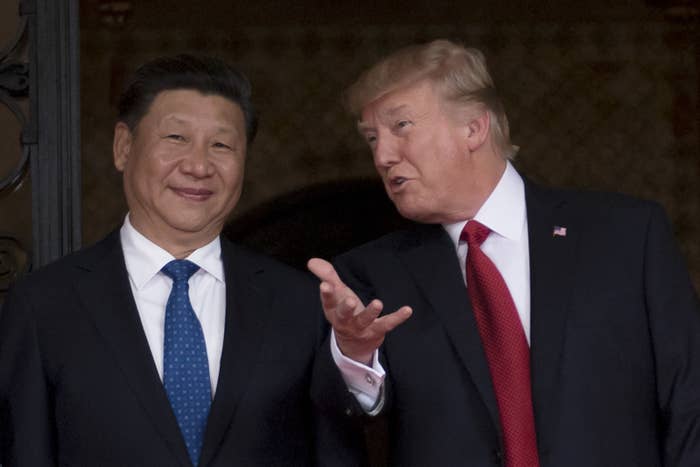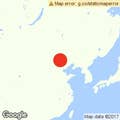
BEIJING — A few weeks ago, a delegation of Chinese academics and retired People’s Liberation Army brass visited the Lowy Institute for International Policy, one of Australia’s top think tanks. They had come with a message: The US now seems to care a whole lot less about small countries in the Asia Pacific — and that means Beijing is the only game in town.
It’s a message that policy wonks in Australia and southeast Asia say illuminates a subtle but unmistakable shift in the Chinese talking points since November, a possible reaction to the ‘America First’ policy put forward by President Donald Trump.
“We’re seeing more confidence among Chinese thinkers, and think tanks related to the state, in coming out proactively against Trump, or at least in saying that Trump’s Asia policy is essentially about withdrawal and absenteeism, and therefore that smaller powers will need to think creatively about how to adapt,” said Hervé Lemahieu, a research fellow at Lowy who attended the meeting with the Chinese. “In between the lines, you can read that we [Australia] may as well get used to China staying, and a less crucial role for the US in the region.”
Members of the delegation summed up the Trump administration’s Asia policy as three “No’s”, Lemahieu said — no Trans-Pacific Partnership trade deal, no more of the Obama administration’s “pivot” to Asia, and no more strategic patience with North Korea. (They also identified a “Yes” — Secretary of State Rex Tillerson’s recent echoing of the Chinese talking point “great power relations” to describe ties between the two countries.) Shared values like human rights and democracy, a key basis of the US-Australian alliance, now matter less to the US government than Washington’s narrow interests, the Chinese delegation told them.
“The implication is that we (Australia) should reexamine our alliance with the US and its validity,” Lemahieu said.
During the Obama years, countries across the Asia-Pacific region, from Vietnam to Australia, became a battleground in the fight for economic and political influence between the United States and China. The Obama administration’s pivot strategy was widely seen as an attempt to keep China from dominating the region by reassuring Asian allies of US economic and military commitment to the region. The strategy, which was later rebranded the “rebalance,” involved the US deploying military assets in the region, negotiating the TPP, and showing its support for regional diplomatic institutions. Foreign policy critics say it faltered early when the administration became bogged down with crises in Ukraine and the Middle East, and was unable to turn its focus to Asia as planned.

But in its first months, the Trump administration has taken a different approach, turning its focus to winning Chinese cooperation on dealing with North Korea’s banned nuclear weapons program. Trump has scuttled the TPP, which supporters say would have cemented political ties with Asian countries, and the administration has said little about the South China Sea, a hot-button issue in Southeast Asia, where several countries have territorial disputes with China.
The administration has also not yet appointed many ambassadors in the region, though high-level US officials including Tillerson have made visits, and Trump is expected to travel to the Philippines and Vietnam in November for diplomatic summits. More significantly, the administration still has not appointed any senior Asia policy officials other than than Matthew Pottinger, who was appointed to oversee Asian affairs at the National Security Council, leaving key posts at the State Department and the Pentagon unfilled.
“I think there is a level of nervousness about ‘America First’ and how that will translate into foreign policy in this part of the world,” said Elina Noor, director for foreign policy and security studies at the Institute of Strategic and International Studies in Malaysia. In contrast, she said, Chinese academics and policymakers have continued to make it clear in public and private that Southeast Asia is important to them.
In January, Chinese President Xi Jinping, who leads the ruling Communist Party, heralded the shift at the World Economic Forum, when he defended globalization and warned against a rising tide of protectionism. It was a moment that felt like the Twilight Zone to some observers in the US and Europe, who have criticized China for years for giving favorable treatment to its own companies in defiance of the World Trade Organization.
“You have China stepping up as the custodian of the global international economic order,” said Richard Heydarian, assistant professor of political science at De La Salle University in Manila, who regularly meets with policymakers around the region. “It’s both a parody and a paradox at the same time.”
Beijing also released a white paper in January outlining its ambitions for boosting security ties in the region. A more assertive approach to diplomatic and military relations is not new for China, but many in the region couldn’t help but interpret the paper in the context of Trump’s election.
China would take on more responsibility for security in the region and around the world, the paper said.
“A lot of people saw the timing of the release of the report and some of the language used by the Chinese leadership as tied to the political change in the US,” said Malcolm Cook, a senior fellow at the Institute of Southeast Asian Studies-Yusof Ishak Institute in Singapore.
Beyond rhetoric, China has continued to pledge billions in aid and loans to southeast Asian countries. Last October, Beijing promised $24 billion in investment pledges and loans to the Philippines a day after Philippines President Rodrigo Duterte announced his “separation” from the US in favor of China. (He later moderated that stance.) China also gave $237 million in soft loans to Cambodia that month in addition to $14 million in military aid.
“That sense that the near future is one where China’s leadership is a given has been going on for the last decade,” Cook added. “I haven’t come across Chinese interlocutors who say Trump changes everything — but many of them say it may accelerate the power transition or make it easier.”
China has stopped short of publicly criticizing the Trump administration or saying it aims to replace the US in the region. The message is more subtle than that.
“China went from charm offensive under [former presidents] Jiang [Zemin] and Hu [Jintao] to whiplash under Xi Jinping,” Heydarian said. “Now since Trump, it’s gone from charm offensive to offensive charm. And more explicit incentives.”

